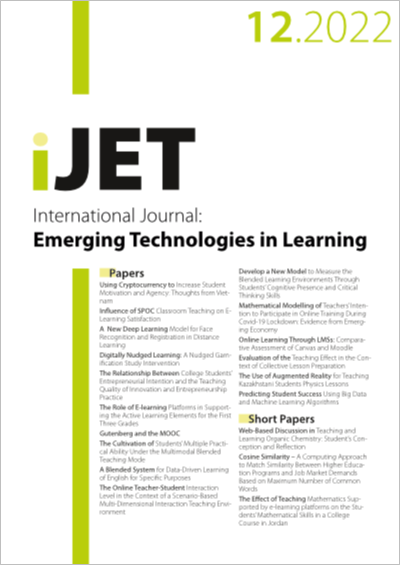Influence of SPOC Classroom Teaching on E-Learning Satisfaction
DOI:
https://doi.org/10.3991/ijet.v17i12.31761Keywords:
SPOC, teaching mode, E-learning satisfactionAbstract
With the rapid development of modern communication technology, more “Internet+” behaviors have been adopted in the field of education. Realizing the teaching objectives via the Internet mode can meet the personalized learning needs of more learners across time and space. In a SPOC class, teachers can encourage learners to actively participate in the E-learning process by adopting various task-driven teaching methods. The BOPPPS teaching mode can provide a complete teaching framework for teachers, achieve good teaching results, and improve the E-learning satisfaction of learners. A regression analysis was performed to explore how six aspects of the BOPPPS teaching mode in SPOC classrooms affected E-learning satisfaction. Results show that the overall Cronbach’s α of the questionnaire was 0.887, the KMO value was 0.869, and the corresponding p-value was 0.000, indicating good reliability and validity. Five aspects of the BOPPPS teaching mode (bridge-in, object, pre-assessment, participatory learning, and post-assessment, summary) have a significant influence on E-learning satisfaction. The acceptance time of the BOPPPS teaching mode had different effects on E-learning satisfaction (p<0.05). Results of this study have a positive reference value for improving the application mode of SPOC teaching design at different teaching levels, expanding the application of the BOPPPS teaching mode in E-learning, and promoting the use of BOPPPS teaching mode in the higher education.
Downloads
Published
How to Cite
Issue
Section
License
Copyright (c) 2022 Dayong Wen, Xianping Wu

This work is licensed under a Creative Commons Attribution 4.0 International License.


